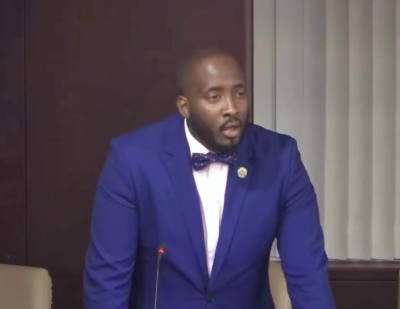 PHILIPSBURG:--- During the Parliament's Central Committee meeting on May 7th, 2025, Member of Parliament (MP) Lyndon Lewis delivered a robust assessment of the ongoing struggles faced by justice workers, drawing from institutional history and personal experience. The meeting, held to address issues surrounding national decrees and payments within the justice sector, provided a platform for MP Lewis to outline systemic failures, critique the pace of government action, and propose practical solutions for overdue reforms.
PHILIPSBURG:--- During the Parliament's Central Committee meeting on May 7th, 2025, Member of Parliament (MP) Lyndon Lewis delivered a robust assessment of the ongoing struggles faced by justice workers, drawing from institutional history and personal experience. The meeting, held to address issues surrounding national decrees and payments within the justice sector, provided a platform for MP Lewis to outline systemic failures, critique the pace of government action, and propose practical solutions for overdue reforms.
Lewis, who served as Minister of Justice before Minister Nathalie Tackling, emphasized the cumulative nature of the current grievances, framing them as longstanding issues that required urgent and meaningful attention. “Next month marks the 18th anniversary of my service as a civil servant in this country,” he began, establishing his intimate understanding of the justice system and grounding his historical perspective. “These grievances are not new; nearly every initial and subsequent decree issued has faced inconsistencies or discrepancies,” he added, highlighting a systemic problem that predates current administration efforts.
A Critical Eye on Delays
MP Lewis was unflinching as he critiqued the current state of the justice worker dossier under Minister Tackling. He expressed frustration at how the decrees (or LBs) are being processed. “This month, Minister Tackling will have had the same amount of time in office as I did,” he noted, stating that during his term, he had signed and processed at least six batches of decrees while also laying groundwork for batch 13. “It’s nearly six months since I departed, and batch 13 has not yet been finalized despite it being initiated during my tenure,” he remarked, expressing apparent dissatisfaction with the rate of progress.
Underscoring his critique, Lewis questioned the decision to remove an associated law firm that had played a key role in carrying out validation under his leadership. “Why was a firm instrumental to the process dismissed, and what alternative mechanisms were put in place to ensure continuity?” he asked. For Lewis, the sudden disruptions in process management were emblematic of deeper issues that need to be addressed at a structural level.
Championing Justice Workers’ Rights
MP Lewis focused much of his intervention on advocating for justice workers to receive their rightful payments and placements. He lamented the enduring delays and lapses in the retroactive payment structure, which he argued should cover workers’ entitlements dating back to the constitutional changes of October 10, 2010. “These retroactive payments are not merely debts; they are moral obligations owed to civil servants who have kept this nation running,” he asserted. He also questioned whether budgetary allocations have been appropriately planned to ensure back payments to justice workers without further delays, referencing phase two payments that go back years.
Lewis further probed the handling of justice workers who have received decrees listing incorrect functions, highlighting cases from his time as a police officer when legal precedents clarified pay discrepancies. He pressed Minister Tackling on current practices, suggesting insufficient consideration for jurisprudence and workers’ legal rights.
Unrealized Plans and Practical Recommendations
The MP expressed concerns over unresolved structural and organizational deficiencies. He emphasized that many justice workers have taken the government to court over their incorrect decrees, underscoring personnel discontent. “It is everyone’s God-given right to contest incorrect decrees,” he said while questioning why the Ministry's court rulings in favor of justice workers seem to have gone unanswered. He recommended clearer enforcement of these rulings to satisfy workers' legitimate claims and avoid further erosion of faith in the government’s ability to administer justice internally.
Lewis also spotlighted the absence of a streamlined approach to awarding jubilees and promotions for long-serving justice workers. Referencing the 25-year milestone, he called for the timely issuing of landsbesluiten and commemorative payments to respect years of dedication to civil service. “People should not have to battle for what they are rightfully entitled to,” he urged, prioritizing pensioners and long-serving employees who might not live to see these payments made.
Urging Leadership and Empathy
Throughout his critique, Lewis emphasized the need for decisive leadership and accountability. He reminded Minister Tackling of the importance of maintaining an open-door policy that directly considers justice workers’ needs. “You have a social ministry, and as such, help find solutions for worker concerns instead of passing them off,” he advised, cautioning against bureaucratic inertia.
The MP closed his address by identifying the key challenges ahead, reiterating his insistence on worker empowerment, resolving state liabilities swiftly, and avoiding costly delays caused by legal disputes. “We continuously allow this unnecessary demotivation, and it has to stop,” he urged pointedly.
Call for Urgency
For Lewis, the stakes are both institutional and personal. The justice workers’ plight represents a test of government accountability and the country’s ability to value its workforce. “This needs to be a priority,” he concluded, pushing for a renewed sense of urgency and commitment to systemic reform.
His contributions stand as a resolute appeal for justice, fairness, and dedication from the Ministry to fulfill promises to its workers while safeguarding public trust.











